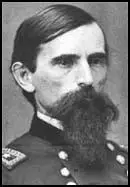Lewis Wallace

Lewis Wallace was born in Brookville, Indiana, ion 10th April, 1827. He worked as a newspaper reporter and lawyer before fighting in the Mexican War (1846-47). He was active in local politics and served in the Indiana legislature.
On the outbreak of the American Civil War Wallace joined the Union Army. Promoted to the rank of brigadier general in August, 1861, and major general in March, 1862. He led his troops at Shiloh and was afterwards a member of the commission that investigated General Don Carlos Buell. and his campaign in Tennessee and Kentucky.
Wallace was commander of the VIII Corps (March, 1864 - February, 1865) but clashed with General Henry Halleck and was twice removed from the post. The first time he was restored on the orders of Abraham Lincoln and the second by Ulysses S. Grant.
After the war Wallace served on the court-martial of Lincoln's assassins and was president of the court-martial that convicted Henry Wirz, the commander of Andersonville.
On 1st May, 1865, President Andrew Johnson ordered the formation of a nine-man military commission to try the conspirators involved in the assassination of President Abraham Lincoln. It was argued by Edwin M. Stanton, the Secretary of War, that the men should be tried by a military court as Lincoln had been Commander in Chief of the army. Several members of the cabinet, including Gideon Welles (Secretary of the Navy), Edward Bates (Attorney General), Orville H. Browning (Secretary of the Interior), and Henry McCulloch (Secretaery of the Treasury), disapproved, preferring a civil trial. However, James Speed, the Attorney General, agreed with Stanton and therefore the defendants did not enjoy the advantages of a jury trial.
The trial began on 10th May, 1865. The military commission included Wallace and other leading generals such as David Hunter, Thomas Harris and Alvin Howe. Joseph Holt was the government's chief prosecutor. Mary Surratt, Lewis Paine, George Atzerodt, David Herold, Samuel Mudd, Michael O'Laughlin, Edman Spangler and Samuel Arnold were all charged with conspiring to murder Lincoln. During the trial Holt attempted to persuade the military commission that Jefferson Davis and the Confederate government had been involved in conspiracy.
Joseph Holt attempted to obscure the fact that there were two plots: the first to kidnap and the second to assassinate. It was important for the prosecution not to reveal the existence of a diary taken from the body of John Wilkes Booth. The diary made it clear that the assassination plan dated from 14th April. The defence surprisingly did not call for Booth's diary to be produced in court.
On 29th June, 1865 Mary Surratt, Lewis Paine, George Atzerodt, David Herold, Samuel Mudd, Michael O'Laughlin, Edman Spangler and Samuel Arnold were found guilty of being involved in the conspiracy to murder Abraham Lincoln. Surratt, Paine, Atzerot and Herold were hanged at Washington Penitentiary on 7th July, 1865. Surratt, who was expected to be reprieved, was the first woman in American history to be executed.
The decision to hold a military court received further criticism when John Surratt, who faced a civil trial in 1867, was not convicted by the jury. Michael O'Laughlin died in prison but Samuel Mudd, Edman Spangler and Samuel Arnold were all pardoned by President Andrew Johnson in 1869.
After the war Wallace returned to Indiana to practice law and to write. His book, The Fair God (1873), told of the Spanish conquest of Mexico. Wallace was appointed governor of New Mexico in 1878. While in office he wrote and published his best-selling book, Ben Hur (1880).
Wallace, who served as Minister of Turkey (1881-85) also published The Boyhood of Christ (1888), The Prince of India (1893) and The Wooing of Malkatoon (1897). His memoirs, Lew Wallace: An Autobiography, was published a year after his death on 15th February, 1905, in Crawfordsville, Brookville.
Primary Sources
(1) The correspondent of the New York World, was highly critical of the military commission that tried Mary Surratt, Lewis Paine, George Atzerodt, David Herold, Samuel Mudd, Michael O'Laughlin, Edman Spangler and Samuel Arnold (26th May, 1865)
The commission has collectively an imposing appearance: the face of Judge Holt is swarthy; he questions with slow utterance, holding the witness in his cold, measuring eye. Hunter, who sits at the opposite end of the table, shuts his eyes now and then, either to sleep or to think, or both, and the other generals watch for the occasions to distinguish themselves.
Excepting Judge Holt, the court has shown as little ability as could be expected from soldiers, placed in unenviable publicity, and upon a duty for which they are disqualified, both by education and acumen. Witness the lack of dignity in Hunter, who opened the court by a course allusion to "humbug chivalry", of Lewis Wallace, whose heat and intolerance were appropriately urged in the most exceptional English; of Howe, whose tirade against the rebel General Johnson was feeble as it was ungenerous! This court was needed to show us at least the petty tyranny of martial law and the pettiness of martial jurists. The counsel for the defense have just enough show to make the unfairness of the trial partake of hypocrisy.

